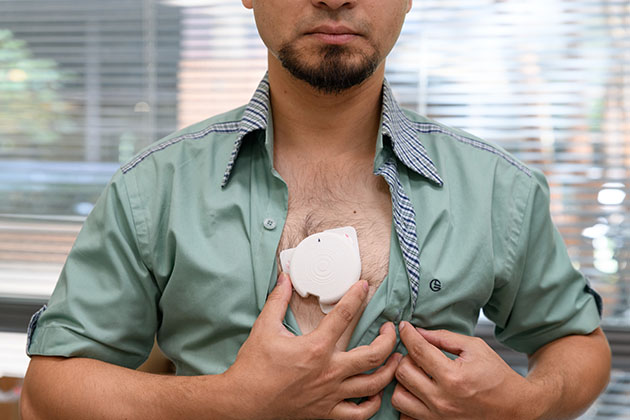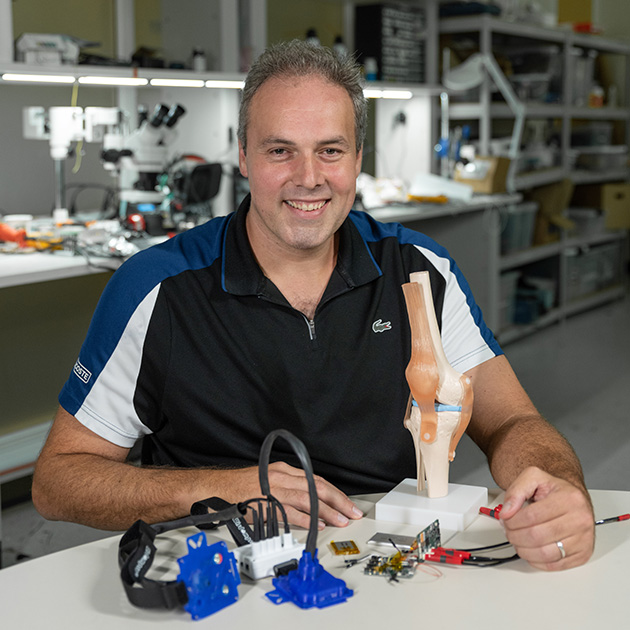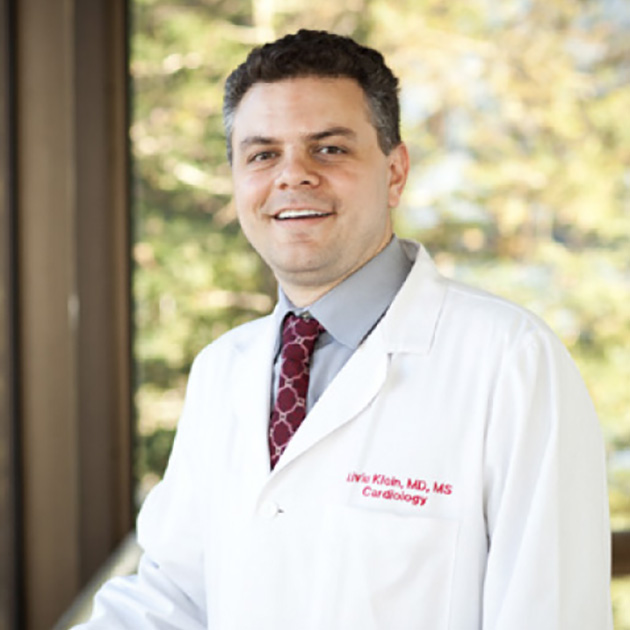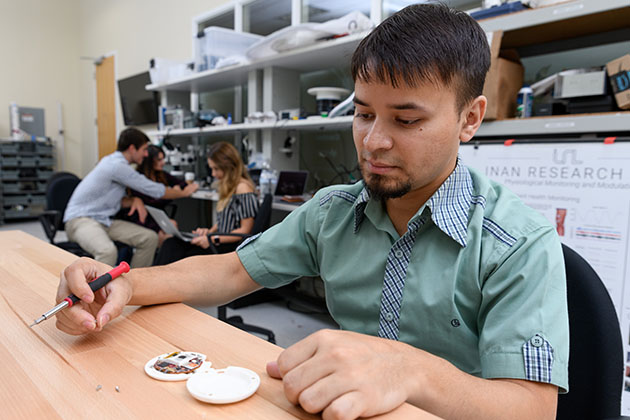Sep 23, 2025
Georgia Tech Startup Sets Sights on Transforming Heart Failure Care
CardioTag™: A Breakthrough Wearable for Continuous, Noninvasive Heart Failure Monitoring Using Seismocardiography and Machine Learning

Student displaying the CardioTag™ heart monitor prototype.
Heart failure remains one of the most challenging conditions to monitor outside the clinic. Patients may experience changes in symptoms, such as fatigue or shortness of breath, between visits, yet many current devices provide limited data, leaving physicians without continuous insight into heart function.
“Despite advances in digital health, continuous monitoring of the heart’s mechanical function has remained difficult outside clinical settings,” said Omer Inan, researcher and entrepreneur at Georgia Tech. “Patients and physicians have long needed a tool that provides deeper, real-time insights into heart performance without invasive procedures. We decided to tackle that problem head-on with a wearable device.”
Inan’s lab got to work using seismocardiography, a technique that measures tiny chest vibrations linked to cardiac activity, to explore new ways of monitoring heart health. Out of that work, a collaboration between Georgia Tech, Northwestern, and University of California San Francisco, came the CardioTag™ device, a lightweight wearable patch that captures multiple signals, including electrocardiography and seismocardiography, to provide a more complete view of how the heart functions in everyday life.
“Traditional monitoring is like checking snapshots of a patient’s heart,” said Inan, also a Regents’ Entrepreneur and professor in the School of Electrical and Computer Engineering. “CardioTag will let us stream the full movie. That level of insight has the potential to change how we treat heart failure and keep patients healthier at home.”
By integrating multiple signals in one device, CardioTag could provide clinicians with noninvasive data that goes well beyond standard monitoring. Paired with advanced signal processing and machine learning, this richer view has the potential to reveal early signs of cardiac decline before they escalate to hospitalization.
“Traditional monitoring is like checking snapshots of a patient’s heart. CardioTag™ will let us stream the full movie. That level of insight has the potential to change how we treat heart failure and keep patients healthier at home.” — Omer Inan, Researcher and Entrepreneur at Georgia Tech
From Research to Clinical Studies to Patient Care

Omer Inan, Regents Entrepreneur, School of Electrical and Computer Engineering.
The foundational discoveries from Inan’s lab have now reached a major milestone. The U.S. Food and Drug Administration recently cleared CardioTag through the 510(k) process, validating its safety and effectiveness as a clinical tool.
“This milestone reflects our mission,” Inan said. “It shows how research can translate into devices that will potentially change patient care in the future.”
CardioTag is now being used in additional research studies with clinical collaborator Liviu Klein, M.D., director of the Advanced Heart Failure Comprehensive Care Center at UC San Francisco. Klein specializes in treating patients with advanced heart failure and arrhythmias and leads programs in remote monitoring and mechanical circulatory support.
As one of the first clinicians to study CardioTag in patient populations, Klein has provided critical feedback on device requirements and utility necessary for widespread adoption. His perspective bridges the gap between engineering innovation and the future of bedside care.
“Being able to capture multiple signals in one wearable opens up an entirely new window into patient care,” he said. “I’ve seen firsthand how the data CardioTag provides can give us a clearer picture of how heart conditions evolve. A wearable like this could allow us to intervene earlier, tailor treatment in real time, and ultimately improve patient outcomes.”
“FDA clearance validates years of collaborative research and strengthens the startup’s potential for success. This is exactly the kind of translational impact our office exists to support.” — Mary Albertson, Director of Technology Licensing at Georgia Tech
The Road Ahead

CardioTag™ Clinical Collaborator Liviu Klein, M.D., director of the Advanced Heart Failure Comprehensive Care Center at UC San Francisco.
Cardiosense, the Georgia Tech spinout advancing CardioTag, is now preparing pilot deployments and expanded clinical trials. For the Office of Commercialization at Georgia Tech, this is another example of research transitioning from the lab to the market, with the potential to improve lives.
Klein envisions CardioTag as part of routine care, once Cardiosense’s other algorithms receive regulatory approval. “My dream is that in five years this is a standard tool for remote monitoring, helping patients stay healthier at home and reducing costly hospitalizations,” he said.
The Office of Technology Licensing guided the intellectual property strategy and commercialization pathway, ensuring the research could move from bench to bedside.
“FDA clearance validates years of collaborative research and strengthens the startup’s potential for success,” said Mary Albertson, director of Technology Licensing at Georgia Tech. “This is exactly the kind of translational impact our office exists to support.”
Learn more about invention disclosure at Georgia Tech.
About Georgia Tech Commercialization

Students working in the Inan Research Lab.
Georgia Tech Commercialization provides a foundation for faculty seeking to translate the Institute's leading-edge research into real-world applications. Commercialization encompasses four pivotal units: CREATE-X, VentureLab, Quadrant-i, and Technology Licensing. These units empower students and faculty to launch startups, provide comprehensive commercialization support, manage intellectual property, and facilitate the transformation of research into viable businesses. The Office of Commercialization’s mission is to provide world-class commercialization services, catalyzing research and innovation to improve the human condition, and enhancing Georgia Tech's position as a leader in technology and entrepreneurial impact.
